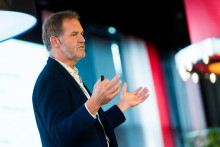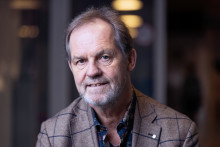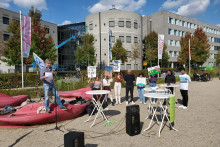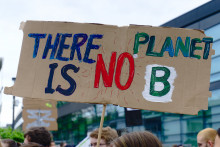Van den Berg has no doubt that good things are occurring on campus to combat climate change, or to properly assess its consequences and adapt accordingly. The professor of Biomedical and Environmental Sensorsystems observes a lack of cohesion and mainly sees bubbles. ‘Our climate research and education is too fragmented and a clear picture is missing. On the contrary, look at health. We offer courses in that, you come across health everywhere and there is even a beautiful building. If a student interested in climate comes here, he or she has to search for what we offer. That has to change.'
Board decision
The advice to write up a proposal to join forces at the UT came from the Shaping Expert Group (SEG) Sustainability, in which the scientific director of the MESA+ institute was involved. Van den Berg, De Boer en Luizink wrote down their idea, had the Strategic Council evaluate them and are now preparing a board decision.. ‘Afterwards we need to appoint the quartermasters (kwartiermakers, ed.) and then we can hopefully start this year. Everyone is positive, so we are moving in the right direction.’
Whether the to be established initiative will be a centre, institute or academy yet to be determined. ‘Of utmost importance is that we establish something sustainable and structural which is not dissolved within two or three years. This topic is so important that it deserves something structural where everything comes together. The UT deserves that too. In the way we offer the climate change theme now, we are not bringing in people.’ The professor cites the TechMed Centre and DesignLab as examples, although he says there is no need for a building right away. ‘But with an institute, you increase your visibility on the map as a university and it’s easier to bring in external funding and also fulfil a regional and (inter)national role'.
Take the leap
According to Van den Berg, the trio's motivation sprouts from their belief that the UT is missing out on opportunities. ‘At the UT, there is potential to develop many insights and solutions that can help us in the climate crisis. For example, think about water-related issues, making people resilient to changes, or which vegetation works well to retain CO2. The ITC has knowledge in the field of Geo-information and BMS houses expertise in how we can study and influence people's behaviour. That combination, GeoSocioTechno, is unique to our our university. We possess all this knowledge, but it’s not connected. We can do more if we make a cluster. We just need to take the leap.'
The trio's idea arose because they believe the pace should be increased. 'We just want to start and gradually learn what can be improved. Everyone is just waiting for each other. Society is looking at us asking what to do. Let us figure that out.'
The professor calls on UT members who feel energy and passion for the idea to get involved. 'We can use everyone. Hopefully, in a while there will be a thriving climate centre. With a club that takes responsibility and wants to act as the UT's business card when it comes to this topic.'






